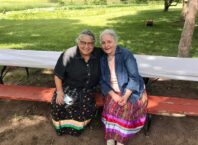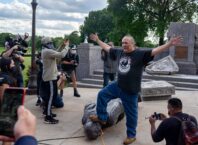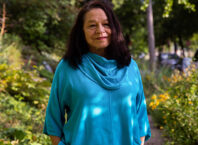By Lee Egerstrom
Robert “Bob” Albee, a community organizer and activist who helped Native and other communities develop tools needed for development and cohesive community action, died on Oct. 6 after battling cancer. He was 76.
Albee was a long time board member of The Circle, helped start WOJB FM radio with the Lac Courte Oreilles Band of Lake Superior Chippewa in northwestern Wisconsin, played early organizing roles with KFAI community supported radio on the West Bank of Minneapolis, was a long-time supporter and backer of The Alley community newspaper in south Minneapolis, and left his imprint on community organizations throughout the Phillips and Ventura Village areas of south Minneapolis.
He didn’t start things to put his name on building or organizations, like many “founders.” Instead, former colleagues and friends say, he helped communities “found” things that they or their communities needed to move forward.
Two examples would include his work with Gordon Thayer, then with the Bureau of Indian Affairs (BIA), when they started the American Indian Task Force on Housing and Homelessness in 1991 in response to housing problems in Minneapolis, and later in organizing what is now known as Ventura Village.
The housing task force emerged into the American Indian Community Development Corp., said Mike Goze, chief executive officer. Its first housing project on Franklin Avenue – Anishinabe Wakiagun – lives on as a model for Native housing development in various parts of the United States, he said.
Ventura Village, meanwhile, was created by Albee and area activists to be a more cohesive unit for community action and development than the huge Phillips Community on the south side of downtown Minneapolis, said Mary Watson, financial administrator for the neighborhood organization.
The Minneapolis City Council subdivided Phillips into four neighborhoods in 2002. Ventura Village is the diverse area south of I-94 south in which Franklin Avenue serves as the commercial hub. Albee was instrumental is pursuing the legal status for Ventura Village, Watson said, “and he even came up with the name.”
Ventura, which is a shortened version of “Buenaventura,” is Spanish meaning “good luck” or “good fortune.”
Colleagues and friends over the years said among his talents was an ability to write formal grant proposals for groups seeking help from government units, nonprofit organizations and foundations.
It was a great help to Lac Courte Oreilles, recalled Eric Shubring, the WOJB’s public affairs director. “He wrote all the application materials except for engineering that we had to submit to get our license (from Federal Communications Commission), and he helped win community support.”
The station, part of the National Public Radio-linked radio network, was started in 1982 when Albee was teaching at Lac Courte Oreilles schools. Its initial objective was to bridge the culture gap between the Ojibwe community and the broader community in the Hayward to Duluth-Superior area of northwest Wisconsin.
“We became known as the first Native-owned radio state east of the Mississippi River,” Shubring said.
He moved to Minneapolis a few years after that and took teaching jobs with Minneapolis and St. Paul schools. His activism with urban community organizations started immediately, friends said.
Among those interests were health and health care needs for communities. He was diagnosed with Type 2 diabetes in 1995. He and his wife Sharon started an information and support group, A Partnership of Diabetics (A-POD), that would meet informally for occasional breakfasts and discuss health issues and their shared health conditions.
Ventura Village’s Watson said this, too, became a way in which Albee broke down barriers and brought together diverse communities that shared common interests. A-POD participants included Somali and East African immigrants and refugees from the Cedar-Riverside neighborhood along with diverse Native, Hispanic and other cultures from Ventura Village and Seward neighborhoods.
This blending and bringing people together was an Albee strength, said Harvey Winje, a board member who has also served as editor of The Alley community newspaper in the broader community area.
He was a friend and mentor for The Alley and its staff over the years, Winje said. And he helped contribute news and information from the Ventura Village neighborhood as well.
“He was a friend. That’s how we knew him. That’s how everyone saw him so he could bring diverse people together,” Winje said.
Albee was also on the board of The Circle newspaper for many years. Cat Whipple, Managing Editor said, “Bob was a friend and mentor to me for over 30 years. He cared deeply about The Circle, Native American journalism, and the Native community. He did a lot of good in this community and any of the communities he came in contact with. He was one of those people that would see a problem and figure out how to fix it.”
Sharon Albee said that when she and Bob retired and moved to the Seattle area three years ago, this organizing and communications work traveled with them. Shortly after moving into a senior living complex, “Bob went to work coordinating a resident association in their apartment building and then creating a resident newspaper.
“He just had to be doing something like that,” she said. “For him it was fun and he saw a community need.”
Albee was born Jan. 16, 1944 in Phillips, S.D. He received a bachelor’s degree from Huron College and a master’s from the University of South Dakota and began a teaching career. This was also the background that made him close and supportive of the Native community and for other ethnic communities, Sharon Albee said.
“He grew up seeing mistreatment, inequality; he bonded with Native people and everyone else who had those experiences,” she said.
He taught audio-visual technology and techniques to students over the years, she added. That made him “really hurt” when he learned that the MIGIZI Communications’ new building on Lake Street was burned in fires after the George Floyd killing by police officers in May. He started his own “gofundme” page on Facebook to help raise money for MIGIZI and its programs for students.
Albee’s close ties to the Native community included heeding some of the rituals, his wife said.
He entered a hospital at Edmonds, Wash., the day before he died. On his last day, she said, he awoke for a few moments, stared up, “and started a smudging ceremony”.
“I thought, ‘He’s watching his spirit go.’ He laid back, crossed his arms over his chest. And died.”







